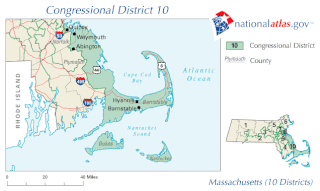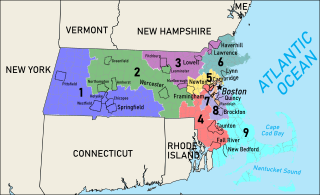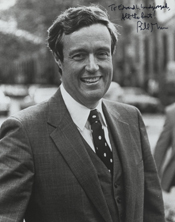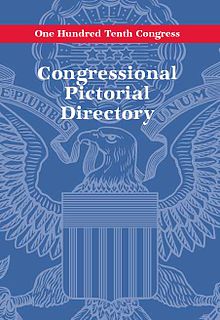The United States Government Publishing Office, formerly the United States Government Printing Office, is an agency of the legislative branch of the United States Federal government. The office produces and distributes information products and services for all three branches of the Federal Government, including U.S. passports for the Department of State as well as the official publications of the Supreme Court, the Congress, the Executive Office of the President, executive departments, and independent agencies.

The 107th United States Congress was a meeting of the legislative branch of the United States federal government, composed of the United States Senate and the United States House of Representatives. It met in Washington, D.C., from January 3, 2001, to January 3, 2003, during the final weeks of the Clinton presidency and the first two years of the George W. Bush presidency. The apportionment of seats in this House of Representatives was based on the 1990 United States census.

Martin Olav Sabo was an American politician who served as United States Representative for Minnesota's fifth district, which includes Minneapolis; the district is one of eight congressional districts in Minnesota.

The Commission on Security and Cooperation in Europe (CSCE), also known as the U.S. Helsinki Commission, is an independent U.S. government agency created by Congress in 1975 to monitor and encourage compliance with the Helsinki Final Act and other Organization for Security and Co-operation in Europe (OSCE) commitments. It was initiated by House representative Millicent Fenwick and established in 1975 pursuant to Public Law No. 94-304 and is based at the Ford House Office Building.

Michael Darr Barnes is an American lawyer and politician who represented the eighth district of Maryland in the United States House of Representatives from 1979 to 1987.

The Federal Depository Library Program (FDLP) is a government program created to make U.S. federal government publications available to the public at no cost. As of April 2021, there are 1,114 depository libraries in the United States and its territories. A "government publication" is defined in the U.S. Code as "informational matter which is published as an individual document at Government expense, or as required by law".

Robert Smith Walker is a former American politician who represented Pennsylvania in the United States House of Representatives as a Republican from 1977 until his retirement in 1997. He was known for his fiery rhetoric and knowledge of parliamentary procedure.

The 112th United States Congress was a meeting of the legislative branch of the United States federal government, from January 3, 2011, until January 3, 2013. It convened in Washington, D.C., on January 3, 2011, and ended on January 3, 2013, 17 days before the end of the presidential term to which Barack Obama was elected in 2008. Senators elected to regular terms in 2006 completed those terms in this Congress. This Congress included the last House of Representatives elected from congressional districts that were apportioned based on the 2000 census.

Massachusetts's 4th congressional district is located mostly in southern Massachusetts. It is represented by Democrat Jake Auchincloss. Auchincloss was first elected in 2020.

Massachusetts's 9th congressional district is located in eastern Massachusetts. It is represented by Democrat William R. Keating. With a Cook Partisan Voting Index rating of D+6, it is the least Democratic district in Massachusetts, a state with an all-Democratic congressional delegation.

Massachusetts's 8th congressional district is located in eastern Massachusetts, including part of Boston. It is represented by Democrat Stephen Lynch. For one congressional term (1791–1793), it served as the home district of the District of Maine. The district boundaries were significantly changed, as of the elections of 2012, due to redistricting after the 2010 census, with the old 8th district largely being shifted to the new 7th district. The new 8th district comprises many of the communities of the old 9th district, as well as some easternmost Norfolk County communities and northernmost Plymouth County communities of the old 10th district.

Massachusetts's 11th congressional district is an obsolete district that was active during three periods: 1795–1843, 1853–1863, and 1873–1993. The district was located in several different areas of the state. It was most recently eliminated in 1993 after the 1990 U.S. census. Its last congressman was Brian J. Donnelly.

William Eldridge Frenzel was an American politician and businessman who represented Minnesota's 3rd congressional district in the United States House of Representatives from 1971 to 1991. A member of the Republican Party, Frenzel previously served in the Minnesota House of Representatives from 1963 to 1971.

Massachusetts's 10th congressional district is an obsolete district that was active during 1795–2013. It was first located in the District of Maine during 1795–1803, then located in several different areas of Massachusetts. It was most recently eliminated in 2013 as district lines were redrawn to accommodate the loss of the seat due to reapportionment as a result of the 2010 census.

Massachusetts is currently divided into nine congressional districts, each represented by a member of the United States House of Representatives. After the 2010 census, the number of seats in Massachusetts was decreased from 10 to nine, due to the State's low growth in population since the year 2000. This mandatory redistricting after the 2010 census eliminated Massachusetts's 10th congressional district, as well as causing a major shift in how the state's congressional districts are currently drawn.

Sedgwick William Green was a Republican member of the United States House of Representatives from New York. He represented a district covering most or all of Manhattan's East Side. To date, he is the last Republican to have represented Manhattan in the U.S. House.

Howard Winfield Robison was an American attorney and politician from New York. A Republican, he served in the United States House of Representatives from 1958 to 1975.
This is an incomplete list of lists pertaining to the United States Congress.
The Official Congressional Directory is the official directory of the United States Congress, prepared by the Joint Committee on Printing (JCP) and published by the United States Government Printing Office (GPO) since 1887. Directories since the 41st Congress (1869–1871) are available online from the Government Publishing Office. Per federal statute the Directory is published and distributed during the first session of each new Congress. It is a designated essential title distributed to Federal depository libraries and the current edition is available for purchase from GPO.
The Periodical Press Galleries (PPG), along with the Daily Press Galleries, Radio and Television Galleries, and Senate Press Photographers’ Gallery, comprise the four media galleries of the United States Congress. The United States Congress is the only legislature to divide its media into distinct press galleries. Collectively known as the Periodical Press Galleries, the PPG maintain two separate offices in the House and Senate wings of the Capitol in order to “assist Members of Congress, Congressional staff, and bona fide correspondents covering Congress, with media logistics and press-related concerns.”
















